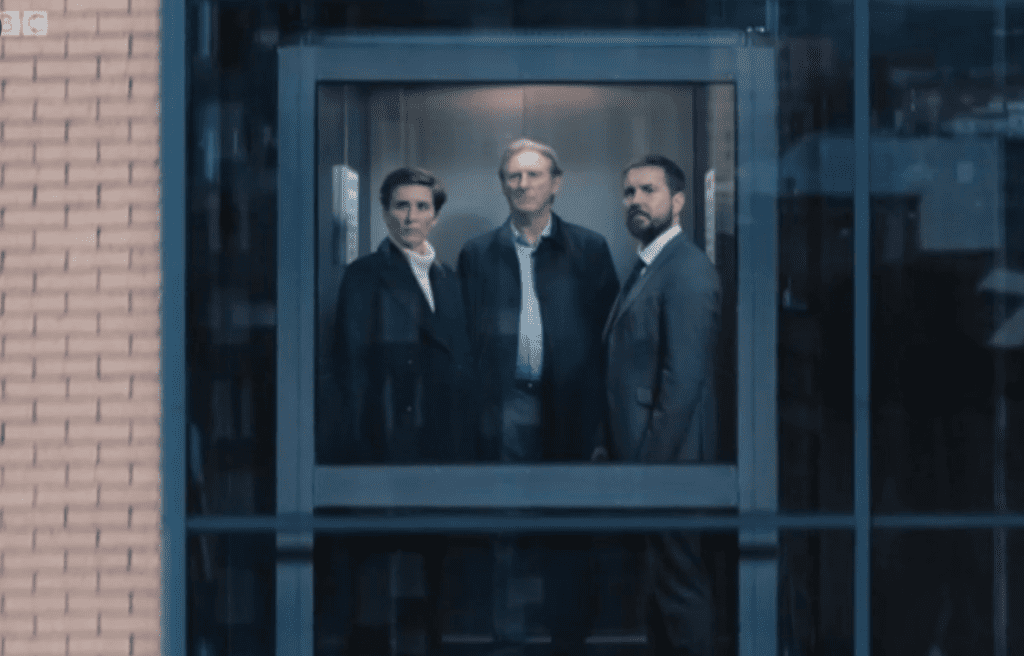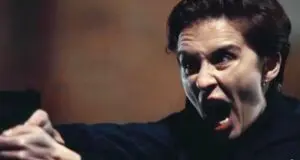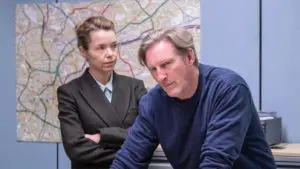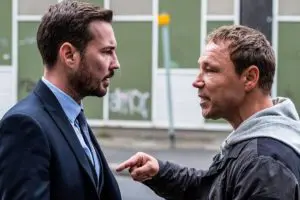Summary
Although Mercurio writes great dramas (and has definately written better than this season), he always tries to make a point about the politics or system relating to his drama. We’ve got that here, for sure; but after all this time, I don’t think it’s what much of the public wanted.
This recap of Line of Duty season 6, episode 7 contains spoilers.
What exactly do we want from a series finale? In the case of Line of Duty, do we want to find that our private detective work has been successful, that we’ve figured everything out; or do we want the writer to be cleverer than the audience? Do we want the Big Bad revealed and brought to justice; or do we want some cynical realism with our drama?
How you feel about this final episode will definitely depend on what you are hoping for or expecting. The mood of last week’s episode had me expecting a climactic stand-off of some sort, but I must say I found it disappointingly mixed: annoying for the most part, and thought-provoking by the end. Here’s what happened…
DI Steve Arnott is still feeling uneasy about what Lee Banks told him about his gaffer, Superintendent Ted Hastings – that Hastings had declared John Corbett to be an undercover officer – and he’s checking Detective Chief Superintendent Patricia Carmichael’s interview tapes from season 5. He suggests to DI Kate Fleming that they let it go, as Hastings will be retiring soon, but she’s firm on the integrity front. (She doesn’t think much of Arnott getting close with Steph Corbett, either.)
It was a good job Fleming asked DS Chris Lomax to check under the floor of the OCG workshop because he and his team have found a locked box containing evidence from several crimes that took place in earlier series. These include a pistol matched with Gail Vella’s murder, gloves with DNA on the outside matching Vella and on the inside matching Carl Banks (their key suspect), knives with PC Maneet Bindra’s and John Corbett’s blood and fingerprints matching PC Ryan Pilkington, a knife with Jackie Laverty’s blood and Tony Gates’ fingerprints. All very neat; though the explanation that this box was kept as blackmail insurance is not unreasonable. Lomax confirmed that there was nothing here connected with Marcus Thurwell, Ian Buckells, or Philip Osborne; and that last baffled him.
Arnott finally goes to see the Occupational Health consultant in Line of Duty season 6, episode 7, though clearly defensive and loathe to be there. I’d rather share a beer or two with Steve Oram (Sightseers) than possibly any actor in this show, and it was a lovely surprise to see him here, playing the role much more seriously than any other I’d seen him in. Arnott doesn’t deny or dodge any questions, but the consultant’s view of Arnott’s welfare is that he should take time off work, and at the very least give up holding firearms for the time being. Arnott brings all this to Hastings, before he could be told officially, and is shaken (daft sod) to find that Hastings already knew.
Fleming reviews the recording of Joanne Davidson’s interview and considers what leads to pursue next, especially if there might be something useful in the person Davidson had previously believed was her father. When she, Arnott, and DC Chloe Bishop get together with Hastings, Bishop updates them that confirmation has been received from Spain that the bodies found in the last episode were indeed Marcus Thurwell and his wife, strangled some weeks ago (so Mercurio had been teasing the audience with James Nesbitt’s “appearance” after all); and that it looks like communications didn’t come from Spain to OCG contacts as previously thought, but merely routed from there, originating in the UK. Amanda Yao (Rosa Escoda), cyber-crime technician, has been following these messages and has found a new one that indicates Davidson is in danger at HMP Brentiss. Not only that, but the badly spelled “definately” appears again, and Hastings instructs Bishop to cross-reference that spelling across all the new files she has had brought in.
Meanwhile, Davidson is being escorted out of the prison, apparently ordered to the Murder Investigation Team’s offices for an interview. The signatures on this production order (Lomax and Fleming) were forged, so it’s pretty clear something bad is afoot. AC-12 intercept the prison van, and both Jenny Leland (Claire-Louise Cordwell) and Alison Merchant, prison officers who we had seen harassing and torturing police inmates earlier in Line of Duty, are arrested. Another plot strand tidied up.
Jo Davidson is back in an interview after this incident, and Fleming urges her to reveal “who the top man is”, and she can then be eligible for witness protection. It does feel as though the male pronoun is used a lot in this scene to make the viewer wonder if they really should be looking for a female mastermind (I was already a little fed up with the neatness of the discoveries so far, and this obvious dangling of a red herring compounded that). Teasingly, the scene cut before she gave an answer.
The next thing we see in Line of Duty season 6, episode 7 is a convoy of five different AC-12 vehicles entering HMP Queen’s Chase, where Hastings gives instructions to authorized firearms officers as well as forensic investigators, on top of his usual bunch: this seems like a bit much for an open prison. Anyway, those who’ve been paying careful attention will know this is where former CSU Patrick Fairbank resides. Forensics search his cell while he is taken for an interview with the utterly exasperated Hastings, who grills Fairbank about burner phones, Spain, Dot Cotton, his claim to be Davidson’s father, and more. The interview doesn’t get anywhere, though: he gets things muddled, has no idea what they’re talking about, and it was all a long time ago. George Costigan’s acting, on the other hand, is probably the best in this episode.
Hastings looks like he’s playing one of those video games where you click on everything just hoping to find hidden loot, sulking more with every dud. Bishop calls with some other lead and when he says “let’s go”, it looks like he’s really thinking “what do we have to lose?”
Back at the office, Bishop tells the gang all about what Cyber Crime has been finding on the sneaky OCG laptops. “Definately” has been found in the communications with Lisa McQueen, and they have now been able to match that against documentation they didn’t have back then, including handwritten documents relating to the Lawrence Christopher inquiry, sixteen years earlier, and police documentation from 2019. Swearing and incredulous looks follow when they see the police signature, but the audience isn’t treated to the name just yet (of course), and there’s an annoying little conversation once Bishop leaves in which the three kick each other and themselves for not twigging this suspect earlier.
Hastings wants to run off and confront Carmichael with this new information, but Arnott and Fleming caution him to be politic about it, and this is their chance to raise concerns with Hastings about the money found at Steph’s. Fortunately, once put on the spot about “loyalty”, he’s open with his two closest colleagues: he talks about giving her the money, and when they squeeze him about talking to Lee Banks, he reveals a sense of guilt and ignorance around John Corbett, and an attempt at atonement in giving the money to Steph. Despite that, he still seems to be looking for judgment.
Next, we see armed police (why?) escorting someone to an AC-12 interview. Again, the audience is teased with nearly being shown a name (on Arnott’s laptop screen). Carmichael is watching the preparation, but this time, she looks wary instead of smug. The back of a prisoner is shown walking slowly towards the interview (get on with it! honestly, there have been more annoying moments in Line of Duty season 6, episode 7 than the whole rest of the series, and we’ve still got twenty-five more minutes to go) and one by one, everyone stares at him; the audience given that pleasure last of all. It’s Ian Buckells, and twelve million people yell at their screens “don’t be ridiculous”.
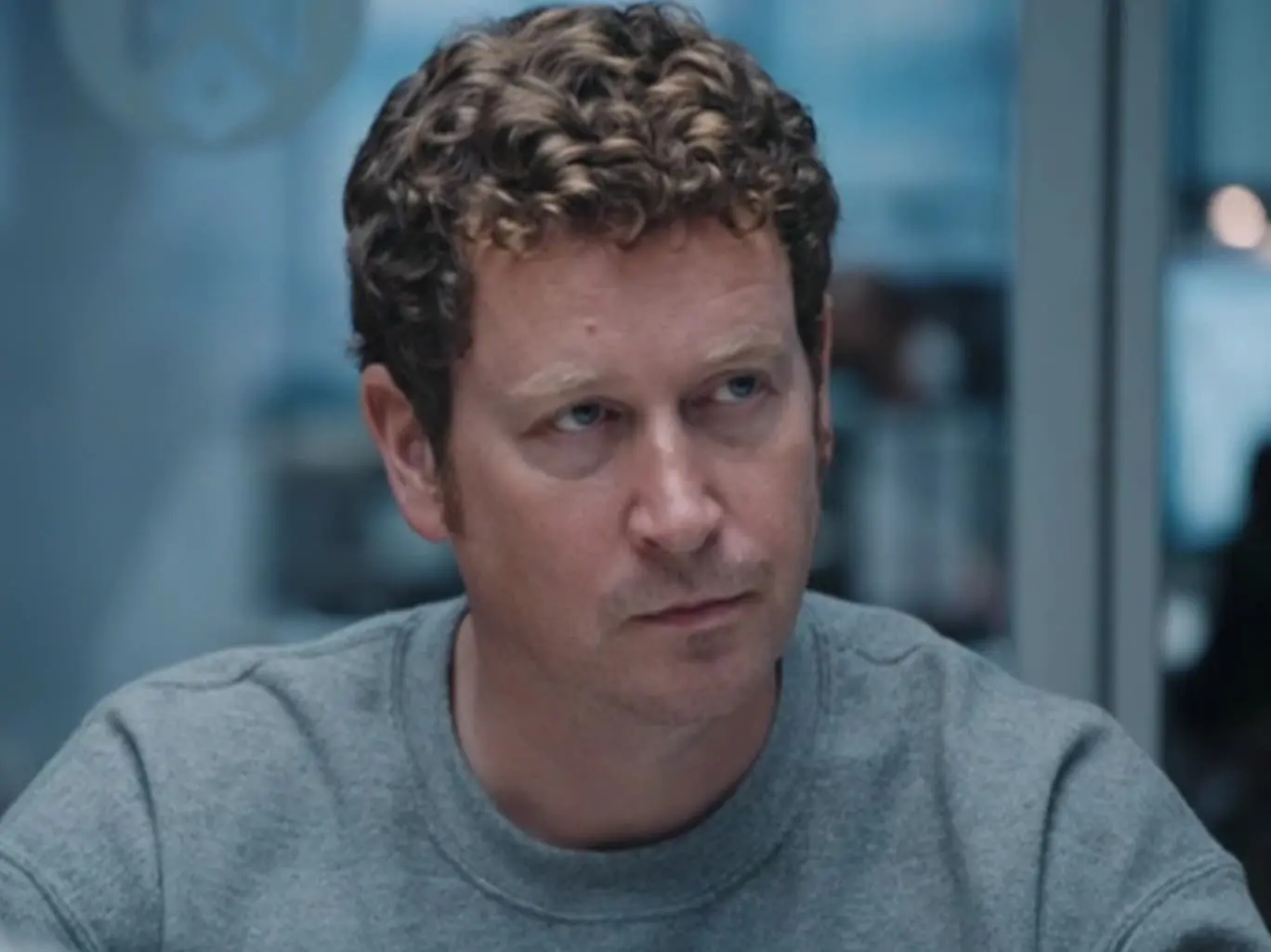
Arnott cautions Buckells and he has “whatever” written on his face, completely not bothered. Buckells is shown some of the evidence they’ve found and seems utterly confused to hear “definately” described as a misspelling. He’s asked about Davidson’s abduction, Vella’s murder, Lakewell’s murder, expensive property, and a hidden laptop with OCG communications. He gives a few “no comment” answers; though these are of the fed-up variety, rather than Davidson’s deer-in-the-headlights performance last week. Hastings directly asks whether Buckells is H or the Fourth Man. The team winds him up with talk of his “crap suits”, “plain simple greed” and incompetence; then the phrase “blundering fool” gets him blabbing, convinced he’s “made total mugs” out of AC-12. Buckells knows they are the only people interested in proving institutionalized corruption, and that everyone higher wants it swept away, and so he’s convinced they’ll give him immunity and witness protection in order to hide their embarrassment and a conclusion they cannot reveal.
Arnott barely conceals a sneer that Buckells surely cannot have been the “top man”. Indeed, Buckells is modest about that: Tommy Hunter was the top man, and Buckells “just passed on the orders”. When the senior officers connected with the OCG were caught (or died), he was still left, a fixer for disparate gangs that had come apart since Hunter died. He’s no mastermind: it’s interesting to discover that the equivalent of a “designated survivor” (in bent copper terms) can keep organized crime running smoothly, a small “h”, rather than a capital one. Buckells has no remorse or sense of responsibility and looks as though he has no fear of justice either.
Then Arnott raises the point that the Organised Crime Group had no motive for Gail Vella’s murder, but corrupt police officers did (to prevent her exposing their part in the Lawrence Christopher scandal). If he refuses to cooperate in that inquiry or had a part in that murder himself, he will not be eligible for the privileges he has asked for. Checkmate; except this is almost like convicting Capone for tax fraud: it’s not the highly corrupt senior officer they had been seeking to capture all these years.
The final ten minutes of Line of Duty season 6, episode 7 are all about wrapping up the show; whether for good or not, no one can be sure, but it does look like it. Arnott and Fleming have a beer together, acknowledge their mutual bond; and Fleming visits the Occupational Health officer. Arnott and Fleming talk to Carmichael about opening cold cases with new evidence (“good luck with that,” she dismisses). Hastings appeals against his enforced retirement and is angry that his team’s efforts are not acknowledged by the Chief, who openly states that allegations of institutionalized corruption are lies. What has been the point of all his efforts, his career, if there is no accountability? As Hastings leaves, he goes back to Carmichael and puts her on the spot with a statement about the leak that led to Corbett’s death: is this something she can ignore, just because he is retiring?
The three leads travel down the lift, looking melodramatic, and all that’s left are the now-traditional closing captions: Terry Boyle freed and in a new home, charges against Jatri dropped, Davidson in (rather comfortable) witness protection, Buckells still in prison, etc. On a less positive note, the Chief Constable’s restructuring plan continues and institutionalized corruption brushed off again.
All the old victims’ pictures are packed away.
Jed Mercurio has been careful to wrap up as much as possible in this season, especially in this episode, reflected in the way Hastings and his crew have doubled down while they still have a chance. It feels hasty to me, and I know it feels anticlimactic to many; but if you watch the whole thing and think “I invested nearly ten years of TV for that” I believe this is intended to reflect the sense of futility around investigating corruption of a scale so large that no-one in authority would allow it to be made public. Although Mercurio writes great dramas (and has definately written better than this season), he always tries to make a point about the politics or system relating to his drama. We’ve got that here, for sure; but after all this time, I don’t think it’s what much of the public wanted.

